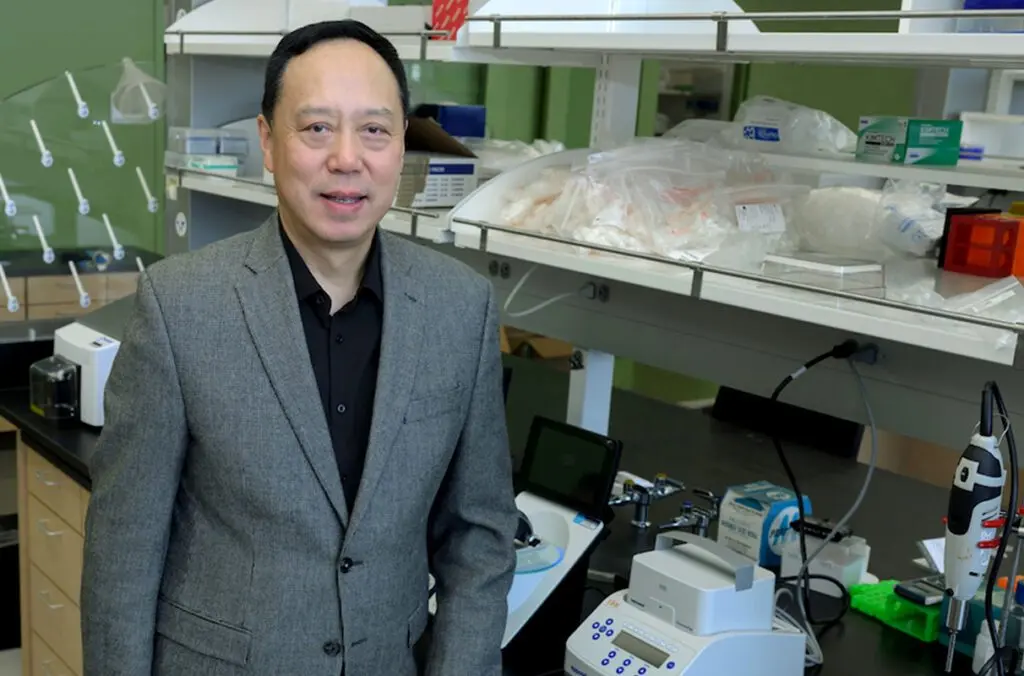PULLMAN, WA – Decades ago, when he was a post-doc attending conferences, Wei Yan began to doubt the prevailing thinking behind efforts to develop a male contraceptive pill.
Most researchers at the time were focused on finding either a hormonal method of interfering with sperm production or a non-hormonal approach aiming to eliminate all sperm cells. But Yan suspected that anything that targeted sperm production in a comprehensive fashion would come with harsh, serious side effects.
A better idea, he came to think, would be to find a way to thwart the sperm cells.
“Don’t kill them,” he said. “Disable them.”
These days, Yan — who joined Washington State University this year as director of the School of Molecular Biosciences after years of prominent work at UCLA — is pursuing research along just those lines, with the hopes of developing a contraceptive pill for men.
Such a discovery would be revolutionary, just as the arrival of the women’s birth-control pill was.
“I think men should share the burden,” he said.
But Yan says funding for that research has lagged. Relatively few grants are available for the research and drug companies have not made it a priority. So, he took to the pages of a major scientific journal to urge a greater investment in the work and to argue that a male contraceptive pill would be a boon for women, given that nearly half of all pregnancies worldwide are unintended.
“I need to advocate for the idea that developing male contraceptives is ultimately a women’s health issue,” Yan said.
Yan’s commentary, “Development of male contraceptives is critical for women’s health,” appeared in the July issue of the journal Biology of Reproduction.
He argues that the failure to push harder for the development of a male contraceptive is a “blind spot” in reproductive health research, and that a male contraceptive would improve the lives of women and families across the world. While there have been major advances over recent decades in contraceptives for women, it’s still true that nearly half of all pregnancies worldwide are unintended, he said.
“If you have 10,000 pregnancies in a town, half of those pregnancies are unintended,” he said. “To me, that says our current options are not sufficient.”
Such pregnancies have significant implications for maternal and child health, socioeconomic status and gender equity. Unintended pregnancies can lead to higher maternal morbidity, reduced educational and economic opportunity and more unsafe abortions, especially in places where abortion rights are restricted.
The idea of a male pill — something along the lines of the women’s birth-control pill — has been around for many years.
“People have been working on it for decades without success,” he said. “The progress made has been very, very limited.”
This arises in part from biological realities. The process of interrupting the production of sperm cells by using hormonal methods is more challenging than interfering with the monthly hormonal cycles of women, he said.
Males produce massive amounts of sperm, and they do so continually. Yan said he sees spermatogenesis as “the most resilient process in the entire body.” Given that it takes a single sperm cell to fertilize an egg, you’d have to wipe them all out to prevent fertilization, he said.
Efforts to find hormonal methods and other mechanisms of limiting sperm production continue — and a team including researchers from the University of Minnesota and Columbia University is at the beginning stages of human trials for a different nonhormonal pill. But Yan’s pursuit of a way to disable the cells has gone from an outlier to an accepted line of research inquiry.
In 2021, his team from The Lundquist Institute, a nonprofit lab affiliated with UCLA, published research about the effectiveness of a compound from a herb used in traditional Chinese medicine in disabling sperm cells.
The compound, triptonide, has been shown to induce infertility in male mice, rats, and monkeys. Research so far shows that the effects are reversible and without side effects. He is continuing that work at WSU, and hoping to move toward the lengthy, multiphase process of developing and winning approval for a human drug through the Food and Drug Administration.
That would take years under the best case. But the limited funding slows down the prospects even more, he said. That’s why he decided to encourage people to rethink the way they view male contraception.
